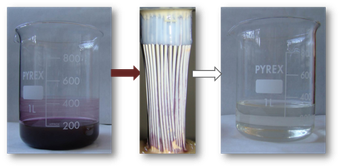Water reuse and recycling
Search line summary

Although having care to minimize the chemical products, water and energy consumption during the production process, at the end there are liquid effluents with organic and inorganic products, some difficult to remove (dyes, flame retardants, antistatic, repellents to water and oil, surfactants, salts etc.).
In this line, the behaviour and improvement of the different purification processes in the purification of industrial effluents are studied. We work both in biological processes (activated sludge, membrane bioreactors – MBR, mobile bed reactors – MBBR, etc.) and with physic-chemical processes (coagulation-flocculation, membranes, advanced oxidation electrochemical processes …).
The research focuses mainly on solving the problems of effluents from the textile industry, but also from other industrial sectors such as fine chemicals, detergents, food, etc.
Main lines of research
- Advanced processes of electrochemical oxidation
- Membrane processes: MF, UF, NF and OI.
- Dye recovery.
- Wastewaters reuse.
- Brine recovery from dye baths.
Projects / Agreements
- Electrochemical technique (EC) combined with UV irradiation for the treatment and reuse of dyeing textile wastewaters: Industrial marketing
- Treatment of industrial effluents using membrane techniques.
- Electrochemical treatment of dyes and reuse of industrial effluents.
- Regeneration and reuse of runoff and drainage water in agricultural plots by combined naturally water treatment systems
- Photoelectric and membrane electrochemical techniques applied to the degradation of little biodegradable compounds in industrial effluents.
- Application of electrochemical processes and UV radiation degradation of reactive colorants to the reuse of dye effluents.
- Application of electrochemical methods to the degradation of reactive colorants and reuse of dye wastewater.
- Discoloration of textile wastewater by electrochemical methods and study of its recycled.
- Study of the effect of microfibers and micro plastics in the sea and human health. Measurement and reduction methods.
Services
- Wastewater recycling and reuse studies.
- Effluents discoloration studies
- Dye recovery studies
- Brine recovery studies
Share: